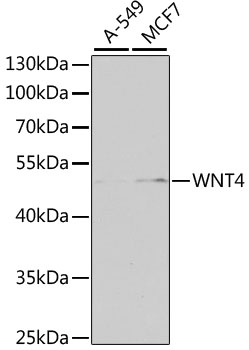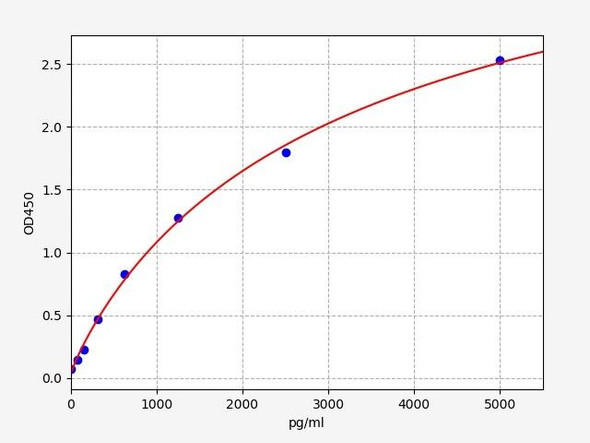Anti-WNT4 Antibody (CAB7809)
- SKU:
- CAB7809
- Product type:
- Antibody
- Reactivity:
- Human
- Mouse
- Rat
- Host Species:
- Rabbit
- Isotype:
- IgG
- Antibody Type:
- Polyclonal Antibody
- Research Area:
- Metabolism
Description
| Antibody Name: | Anti-WNT4 Antibody |
| Antibody SKU: | CAB7809 |
| Antibody Size: | 20uL, 50uL, 100uL |
| Application: | WB |
| Reactivity: | Human, Mouse, Rat |
| Host Species: | Rabbit |
| Immunogen: | Recombinant fusion protein containing a sequence corresponding to amino acids 122-351 of human WNT4 (NP_110388.2). |
| Application: | WB |
| Recommended Dilution: | WB 1:500 - 1:2000 |
| Reactivity: | Human, Mouse, Rat |
| Positive Samples: | A-549, MCF7 |
| Immunogen: | Recombinant fusion protein containing a sequence corresponding to amino acids 122-351 of human WNT4 (NP_110388.2). |
| Purification Method: | Affinity purification |
| Storage Buffer: | Store at -20°C. Avoid freeze / thaw cycles. Buffer: PBS with 0.02% sodium azide, 50% glycerol, pH7.3. |
| Isotype: | IgG |
| Sequence: | FAVT RACS SGEL EKCG CDRT VHGV SPQG FQWS GCSD NIAY GVAF SQSF VDVR ERSK GASS SRAL MNLH NNEA GRKA ILTH MRVE CKCH GVSG SCEV KTCW RAVP PFRQ VGHA LKEK FDGA TEVE PRRV GSSR ALVP RNAQ FKPH TDED LVYL EPSP DFCE QDMR SGVL GTRG RTCN KTSK AIDG CELL CCGR GFHT AQVE LAER CSCK FHWC CFVK CRQC QRLV ELHT CR |
| Gene ID: | 54361 |
| Uniprot: | P56705 |
| Cellular Location: | Secreted, extracellular matrix, extracellular space |
| Calculated MW: | 32kDa/39kDa |
| Observed MW: | 46kDa |
| Synonyms: | WNT4, SERKAL, WNT-4 |
| Background: | The WNT gene family consists of structurally related genes which encode secreted signaling proteins. These proteins have been implicated in oncogenesis and in several developmental processes, including regulation of cell fate and patterning during embryogenesis. This gene is a member of the WNT gene family, and is the first signaling molecule shown to influence the sex-determination cascade. It encodes a protein which shows 98% amino acid identity to the Wnt4 protein of mouse and rat. This gene and a nuclear receptor known to antagonize the testis-determining factor play a concerted role in both the control of female development and the prevention of testes formation. This gene and another two family members, WNT2 and WNT7B, may be associated with abnormal proliferation in breast tissue. Mutations in this gene can result in Rokitansky-Kuster-Hauser syndrome and in SERKAL syndrome. |
| UniProt Protein Function: | WNT4: Ligand for members of the frizzled family of seven transmembrane receptors. Probable developmental protein. May be a signaling molecule which affects the development of discrete regions of tissues. Is likely to signal over only few cell diameters. Overexpression may be associated with abnormal proliferation in human breast tissue. Defects in WNT4 are a cause of Rokitansky-Kuster-Hauser syndrome (RKH syndrome); also called Mayer- Rokitansky-Kuster-Hauser syndrome (MRKH syndrome or MRKH anomaly). RKH syndrome is characterized by utero-vaginal atresia in otherwise phenotypically normal female with a normal 46,XX karyotype. Anomalies of the genital tract range from upper vaginal atresia to total Muellerian agenesis with urinary tract abnormalities. It has an incidence of approximately 1 in 5'000 newborn girls. Defects in WNT4 are the cause of female sex reversal with dysgenesis of kidneys, adrenals, and lungs (SERKAL); also known as SERKAL syndrome. Defects in WNT4 are the cause of Muellerian aplasia (MULLAPL). Belongs to the Wnt family. |
| UniProt Protein Details: | Protein type:Secreted, signal peptide; Secreted Chromosomal Location of Human Ortholog: 1p36.23-p35.1 Cellular Component: cell surface; cytoplasm; endoplasmic reticulum lumen; extracellular region; extracellular space; Golgi lumen; plasma membrane Molecular Function:frizzled binding; receptor agonist activity; transcription corepressor activity Biological Process: adrenal gland development; androgen biosynthetic process; cell fate commitment; epithelial to mesenchymal transition; female gonad development; female sex determination; kidney development; liver development; male gonad development; negative regulation of transcription, DNA-dependent; neuron differentiation; positive regulation of aldosterone biosynthetic process; positive regulation of bone mineralization; positive regulation of collagen biosynthetic process; positive regulation of osteoblast differentiation; positive regulation of transcription, DNA-dependent; Wnt receptor signaling pathway; Wnt receptor signaling pathway through beta-catenin Disease: 46,xx Sex Reversal With Dysgenesis Of Kidneys, Adrenals, And Lungs; Mullerian Aplasia And Hyperandrogenism |
| NCBI Summary: | The WNT gene family consists of structurally related genes which encode secreted signaling proteins. These proteins have been implicated in oncogenesis and in several developmental processes, including regulation of cell fate and patterning during embryogenesis. This gene is a member of the WNT gene family, and is the first signaling molecule shown to influence the sex-determination cascade. It encodes a protein which shows 98% amino acid identity to the Wnt4 protein of mouse and rat. This gene and a nuclear receptor known to antagonize the testis-determining factor play a concerted role in both the control of female development and the prevention of testes formation. This gene and another two family members, WNT2 and WNT7B, may be associated with abnormal proliferation in breast tissue. Mutations in this gene can result in Rokitansky-Kuster-Hauser syndrome and in SERKAL syndrome. [provided by RefSeq, Jul 2008] |
| UniProt Code: | P56705 |
| NCBI GenInfo Identifier: | 20532425 |
| NCBI Gene ID: | 54361 |
| NCBI Accession: | P56705.4 |
| UniProt Secondary Accession: | P56705,Q5TZQ0, Q96T81, Q9BXF5, Q9H1J8, Q9UJM2, B4DJF9 |
| UniProt Related Accession: | P56705 |
| Molecular Weight: | 32,954 Da |
| NCBI Full Name: | Protein Wnt-4 |
| NCBI Synonym Full Names: | Wnt family member 4 |
| NCBI Official Symbol: | WNT4 |
| NCBI Official Synonym Symbols: | WNT-4; SERKAL |
| NCBI Protein Information: | protein Wnt-4 |
| UniProt Protein Name: | Protein Wnt-4 |
| UniProt Gene Name: | WNT4 |
| UniProt Entry Name: | WNT4_HUMAN |









